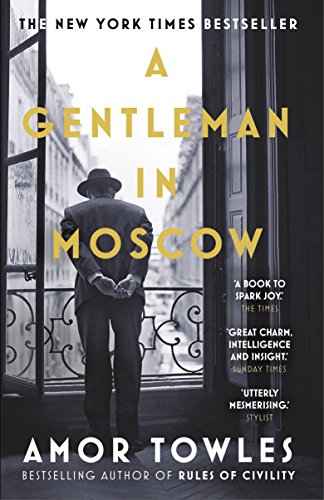“As both a student of history and a man devoted to living in the present, I admit that I do not spend a lot of time imagining how things might otherwise have been. But I do like to think there is a difference between being resigned to a situation and reconciled to it.” [loc. 3423]
In 1922, Count Alexander Rostov is summoned before the Emergency Committee of the People’s Commissariat for Internal Affairs. As an aristocrat, he expects to be executed: but a revolutionary poem he once wrote is his salvation, and instead he is designated a Former Person and sentenced to life imprisonment in his current residence, the Hotel Metropol. Instead of the suite that's been his home for years, he is exiled to an attic room, without the majority of his possessions: but the Count is a resourceful fellow, and a remarkably cheerful one. (Also, he has concealed a fortune in gold pieces in the hollow legs of his desk.) He's been raised on the maxim that 'if a man does not master his circumstances then he is bound to be mastered by them', and he applies his wit, charm and sociability to the task of making his imprisonment a civilised, refined and enjoyable experience.
This was a charming read, somewhat reminiscent of Wes Anderson's Grand Budapest Hotel (and also The French Despatch, for the idiosyncrasies of the characters). The Count is a likeable protagonist, genial and urbane, determined to maintain his standards despite the horrors of life outside the hotel. (Towles confines most of the unpleasantness to footnotes, recounting the fate of one incidental character or another, or simply 'Let us concede that the early thirties in Russia were unkind'.) He is befriended by nine-year-old Nina: many years later, he becomes a kind of father to Nina's daughter Sofia. His other friends include a glamorous film star, a seamstress, the waiters at the hotel's restaurants (indeed, he becomes a waiter himself), an intellectual revolutionary, a Party official with whom he watches Casablanca, and an American diplomat. The denouement is a delight worthy of Le Carre: and the Count's (and the author's) affection for the lost world of the Russian aristocracy is appealingly sugar-coated, rose-tinted, affectionate nostalgia.
Fulfils the ‘A city or country in the title’ rubric of the 52 books in 2023 challenge.

No comments:
Post a Comment